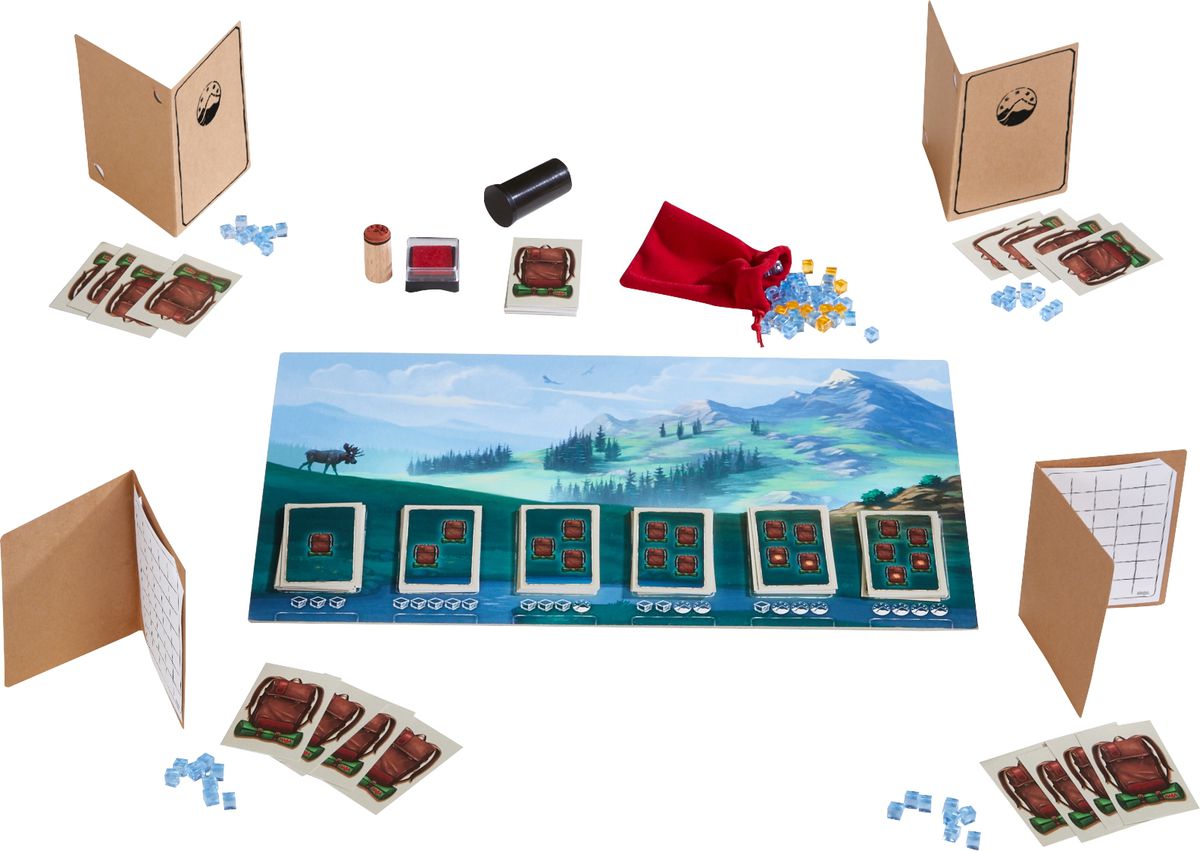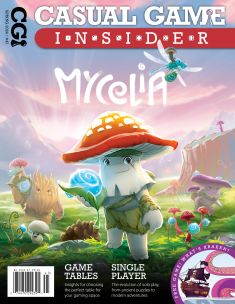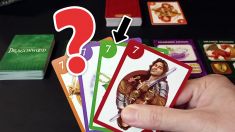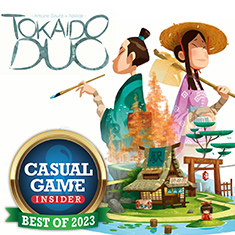Put On Your Hiking Boots and Reach Summits in Mountains

The latest in HABA’s Game Night Series, Mountains challenges players’ minds and endurance.
Gameplay
Mountains is a 2-5 player game that utilizes simple mechanics to make for a tricky, but fun gaming experience. Players begin with item cards (the number of which is determined by how many players are in a given game) and 8 blue cubes, which are favor tokens. Item cards feature various equipment necessary while hiking (canteens, carabiners, etc.) and will help players complete hikes. Hikes are displayed in face-down piles on the central player board in six piles, from the easiest (one item to complete the hike) to the hardest (five items to complete the hike).
The first player begins by turning over one of the hikes of their choosing on the central board. If a player chooses a one item hike and has the item in their hands, they will place the item face up on the table and collect the reward shown on the card before discarding it. These rewards include additional favor tokens or a set number of stamps to be placed in their individual hiking passport (using the game’s stamp and stamp pad). These should be kept hidden from the other players. The more difficult the hike, the more stamps, favor tokens, and better benefits occur upon completion.
As hikes become more difficult, it’s likely players will lack all the items necessary to complete the requirements within their own hand of item cards. This is where favor tokens come into play. Much like the classic card game Go Fish, players will ask another player if they have any of the items necessary to complete the hike by first giving them a favor token. If the other player does have the item, they will place it face up on the table and the active player will be able to use it to complete the hike requirements. If the other player does not have the item, they still receive the favor token. The active player may continue to dole out favor tokens to find the necessary equipment until they run out of them or complete the hike requirements.
If a player runs out of favor tokens, they can elect to use a turn as a rest day, receiving three blue tokens. If a player turns over a difficult hike and believes they will not be able to meet the requirements, they may discard the hike for one favor token (so long as they do not try to ask other players for equipment). Once two piles of the more difficult hikes (3-5 item requirements) are depleted, the end of the game is immediately triggered. Players will count how many stamps they have in their passports, with the most winning the game. In case of a tie, the player with the most favor tokens will then be declared the winner.

Review
As HABA continues to grow its Game Night label of games, it's the titles such as Mountains that will serve as a bridge between their yellow-label family-weight games and these thinky, puzzly titles. Mountains may be the lightest weight of these games, but do not be fooled.
The memory aspect of Mountains will sharpen younger minds and keep older players on their toes. In 4-5 player games, remembering who has what equipment will be vital to collecting stamps and gaining the best benefits the game has to offer. The four and five star hikes will also require players to find two of the same items, so that added layer of depth can trip up even the keenest memory. Some may find the memory element of Mountains too much to endure, but most board games require some use of memory — even if it’s just to keep track of what other players have done or plotting out one’s moves a few turns in advance. Mountains uses memory in its most basic form, yet that does not mean it’s an easy game.
The cooperative element also promotes fairness in gameplay; a lesson that transcends age groups. To be successful in any game of Mountains, players will need to rely on others to complete hikes. The rules for Mountains are very adamant concerning being honest in player-to-player interactions, even if it also promotes an air of competitiveness as players accumulate stamps in their hidden hiking passports. This works excellently with the theming of the game, where hikers will often help each other out on a trail or during a climb but also race to complete the most summits in a season or reach the peak in the fastest time.
The variability in the game is also something that will surprise players. Some hike rewards may benefit all players, for example the ability for anyone to pay a set amount of favor tokens to gain a stamp for a hike. This also ties in nicely with the game’s push-and-pull between cooperative benefits and competitive outcomes.
Fans of HABA’s Game Night lineup may find Mountains too easy in comparison to the line’s other titles (Karuba, Adventure Land, Honga, etc.) but much like those games, Mountains is focused on introducing a clever take on a simple mechanic. And depending on the gaming group, the dynamics of how the game is played will change with each playthrough. It’s yet another welcome addition to HABA’s expansion where renowned designers and simple designs collide in games that challenge gamers of all ages and experience levels.
Pros: Clever take on memory mechanics, great blend of cooperative and competitive elements, good components including a stamp and pad, variability in rewards
Cons: Some players may dislike the dependence on memory









